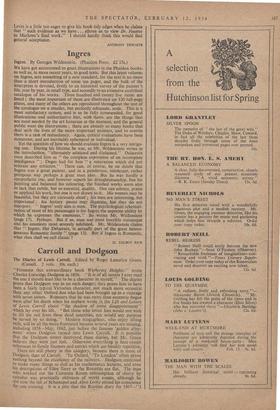Ingres
WE have got accustomed to good illustrations in the Phaidon books, as well as, in more recent years, to good texts. But this latest volume, on Ingres, sets something of a new standard, for the text is no more than a short introduction of some ten pages, and the bulk of the letterpress is devoted, firstly to an historical survey of the painter's life, year by year, in small type, and secondly to an extensive analytical catalogue of his works. Three hundred and twenty five items are listed ; the most important of them are illustrated on 120 full-page Plates, and many of the others are reproduced throughout the text of the catalogue on a smaller, but perfectly adequate, scale. This is a most satisfactory system, and is to be fully commended, for good illustrations and authoritative lists, with dates, are the things that are most needed by the art historian at the moment, and the general public want the illustrations ; there are already so many books that deal with the lives of the more important painters, and to rewrite them is a task of redundancy. Again, critical evaluations have been numerous, and arc inevitably ephemeral or individual.
Yet the question of how we should evaluate Ingres is a very intrigu- ing one. During his lifetime he was, as Mr. Wildenstein writes in the introduction, "alternately adulated and disdained." Delacroix once described him as " the complete expression of an incomplete intelligence " ; Degas had for him " a veneration which did not tolerate any criticism." There can, of course, be no doubt that Ingres was a great painter, and in a ponderous, intolerant, rather pompous way perhaps a great man also. But he was hardly a Sympathetic one, and however superb his draughtsmanship, fine his painting and balanced his colouring, the finished works seem also to lack that subtle, but so essential, quality. One can admire, praise or applaud his work, but one is not drawn to it. His women may be beautiful, but they are curiously aloof ; his men are interesting, but impersonal ; his history pieces may illustrate, but they do not interpret. " Ingres' only aim is man. The psychological schemati- zation of most of his personages is for Ingres the supreme ability by which he expresses the emotions." So writes Mr. Wildenstein (page 17). Perhaps. But if so, man was most horribly statuesque and his emotions most severely inhibited. Mr. Wildenstein claims that " Ingres, like Delacroix, is actually part of the great hetero- geneous Romantic family " (page 13). But if Ingres is Romantic, What then shall we call classic ?


































 Previous page
Previous page